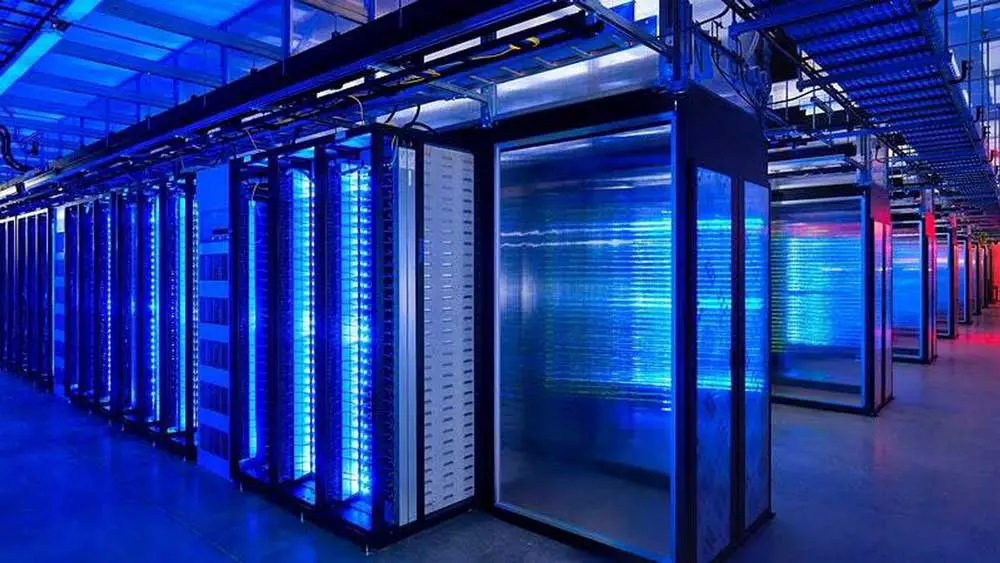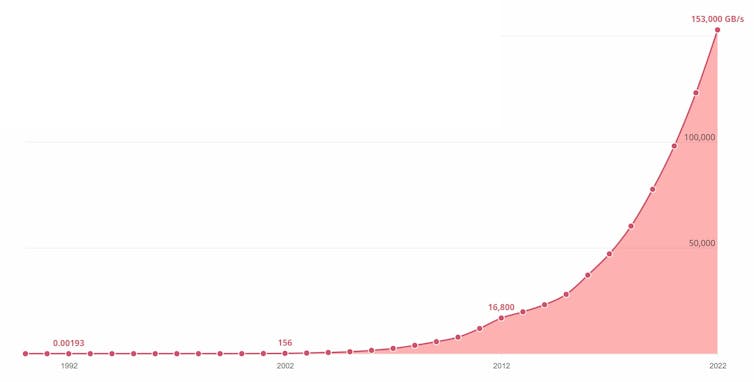
By Stefano Bonetti
We are used to thinking that going digital means going green. While that is true for some activities – for example, making a video call to the other side of the ocean is better than flying there – the situation is subtler in many other cases. For example, driving a small car to the movie theatre with a friend may have lower carbon emissions than streaming the same movie alone at home.
How do we reach this conclusion? Surprisingly, making these estimates is fairly complicated. This is due to two reasons: we do not have good data to start with, and even when we do, the comparison with other human activities is often difficult to make. In a September 2022 report, “Data Centres and Data Transmission Networks”, the International Energy Agency (IEA) stated:
“There are currently no comprehensive data on the energy use of all data centre operators globally, so this estimated range is based on bottom-up models.”
This is remarkable given that we have been able to estimate quite accurately phenomena that are much more complex. In this case, we would only need quantitative information – the electrical energy and the amount of data used – that can be determined with great accuracy. The current situation is not acceptable and should be addressed soon by policymakers.
Talking of tons of CO2 emitted, kilowatt-hours for electricity, cubic metres for gas, litres of gasoline and cars’ horsepower creates confusion in many, including academics. Most people would not be able to say how much energy they use daily nor what level of emissions these activities cause. But they would be able to tell you right away their salary or monthly rent. The ease of talking about money lies in the fact that we humans long ago decided that a commonly held currency was the best way to trade disparate things. We don’t do this for our energy use, hence the difficulty.
There is no reason not to change the situation, however: the beauty of the concept of “energy” is that nature gave it to us as a number that is mysteriously conserved even when we change its form – for example, from electrical to thermal. Hence, we can always convert it into a single convenient unit, which would make it easy for us to understand the impact of our activities on the planet, including the digital ones.
Apples to apples
Let’s see how this could work by spelling out some examples. We choose the energy unit to be the kilowatt-hour (kWh). This proposal was made by David MacKay in his 2008 book Sustainable Energy, Without the Hot Air. Why the amount of energy used rather than the CO2 emitted? On the global level, the two concepts are equivalent, given that CO2 emissions are proportional to the amount of non-renewable energy produced. But almost none of us has an intuitive idea of what a ton of CO2 is, let alone its global scale values, or how it is generated. On the contrary, almost all of us can read an energy bill and relate it to what was done at home.
Here are three examples:
- A 10W light bulb kept on for an hour will consume 0.01 kWh of energy (1 kWh = 1,000 Wh).
- A car driven in a city for one hour using an average power of 10 kW (approximately 13 horsepower) will consume 10 kWh.
- In Northern Italy during winter, heating an apartment using 10 cubic metres of gas requires approximately 100 kWh per day or 4 kWh for each hour.
When these activities are compared with the same units, it is clear that there are some (driving, heating) that would have a much broader impact than others (lighting) if their use is curtailed.
A two-hour film pollutes as much as a 45-minute car drive
With this in mind, let’s try to estimate the use of Internet in the same units. What we are after now is the amount of energy for a given amount of data transferred, expressed in gigabytes (GB). As mentioned, there are surprisingly no consistent numbers available. Estimates range from 0.1 kWh per GB (Andrae, Huwaei) to 10 kWh per GB (Adamson, Stanford Magazine) – 100 times more. The lower number seems to assume an unrealistic amount of data, almost 10 times the one reported by the World Bank, and implying an average worldwide data usage which is still uncommon even for the Western world (3,000 GB per year rather than 300). On the other hand, the higher estimate seems to have not considered the latest developments in energy efficiency due to new technologies.
It seems that a value of 1 kWh per GB could be a reasonable approximation of the current energy cost of data. Using that estimate, we can now more easily compare the energy use of data with other human activities. For instance, a two-hour movie in 4K resolution is about 7 GB, or approximately 7 kWh of energy, comparable to a 45-minute car drive. This is mind-boggling for something that we perceive as immaterial. Similar estimates would make you figure out that 300 Google searches use approximately 0.1 kWh, which is the same energy required to boil one litre of water starting from 20 degree Celsius, another mind-boggling realisation.
It is possible and plausible that technology will make Internet more energy efficient – that is what many of us physicists try to help with while studying novel materials and approaches to store and manipulate data. However, if we keep increasing the data usage, we will not decrease our energy use. For instance, movies in 8K resolution require four times more data than in 4K resolution.
Consumption on the rise

WDR 2021, Cisco Visual Networking Index, 2017–2022, CC BY
The proof is that for several years now, the annual energy consumption of information and communication technology infrastructure is constantly at least 2,000 TWh, 5% of the global electricity use. Projections suggest that we will reach 10% by 2030, indicating that technology may not keep up unless we introduce fundamental new approaches.
There is no doubt that the Internet and a more digital life offer an incredible opportunity to decrease our energy use and reduce our carbon footprint. For example, a single person on a fully loaded long-range round-trip plane flight – say from Venice, Italy, to Los Angeles, California – to attend an in-person meeting has an energy cost of 10 000 kWh. Using the estimates above, it would take eight months of 12-hour-long video meetings in 4K resolution for that person to consume the same energy. In this case, there is no doubt that streaming, not flying, is the best choice.
As with all technology, however, Internet use has an energy cost. It is proportional to the amount of data transferred, and use is highest with images and especially video. When heavily used, its impact becomes comparable to the one of activities that we already recognise as energy-hungry, such as driving a car. We clearly need more precise numbers to take the appropriate measures at the political level.

Christina Morillo/Pexels, CC BY
In advance of having them, we as private individuals can use data in a considerate manner:
- Turn off the camera when not needed in a video call.
- Decrease the video resolution when possible, particularly on small screens.
- Watch movies when they are broadcast rather than using on-demand services, which require dedicated computational power and data for each viewer.
- Finally, let’s start thinking in kWh about everything we do, and do our part to help the implementation of such a standard. In this way, we will talk with the same energy currency, as we do with money.
To help make this happen, write to your gas company, car manufacturer, grocery store and any manufacturers to get them to provide numbers in kWh of everything they sell. This would allow us to set up individual “energy wallets” and decide how to spend what we have in a sustainable way and thus reach our climate goals. Once these goals are defined in a clear and concrete way, it will much easier for individuals, companies and governments to take a sensible course of action every day, in all things large and small.
Part of the frustration that many of us experience these days is that we feel powerless against climate change because we do not have a concrete representation of how to do something about it in our daily life. By talking about the problems in units that we understand and perceive, we will close the gap between the local and the global scales, and hence be more effective in our actions.
Stefano Bonetti, Professor of Experimental Condensed Matter Physics, Ca’ Foscari University of Venice
This article is republished from The Conversation under a Creative Commons license. Read the original article.
![]()
Stefano Bonetti is Professor of Experimental Condensed Matter Physics, Ca’ Foscari University of Venice.






























Jimbo99 says
End of the day, each individual needs to own their own carbon footprint. The 8 Billionth human being was counted as reaching that number, as the global population grows, where they end up for immigration, legal or not, any time there are more humans per square mile than before is a pollution problem & global warming issue for that specific location. The reality is, the essentials keep lying to the masses about saving the planet, then it’s a matter of controlling consumption to a neat stall & trickle. That’s what the pandemic brought us, supply shortages ? Nope, that’s someone making another/others go without, the gouges of greed.
Dennis C Rathsam says
What a load….All you greenies out there, France just fired up its coal plants again, Germany never turned theirs off & China is building 3 more power plants. Why should the people of the United States pay the price, while the rest of the world polutes the air?
Pierre Tristam says
True, China is now emitting double the greenhouse gases than the United States, though the US is still an undisputed second. Even if it weren’t. Even if it were 50th: for decades it was the champion of pollution, accounting for roughly a quarter of the gas trapped in our atmosphere, globally, today, and causing warming. Are we to just write off that responsibility just because the standings have changed? It’s like absolving a felon of his 30-year sentence because a new one was just booked with 40 years.
Foresee says
Grandma always said “If someone jumps off a bridge does that mean you should too?”
The dude says
Because we can. Because we should. Because it’s right.
The planet ain’t gonna save itself.
Ben Hogarth says
No offense to the professor and author of the article, but moot discussion points like these only serve as distractions – and detract from solutions-based policy conversations. To elaborate, it does NOT matter how many watts of energy are expended on the energy grid for server / IT usage versus an automobile going from A-Z if the energy produced and consumed is renewable. Solar, wind, and perhaps one day even fusion – these sources of energy are the future. These sources of energy completely dispel any notions that carbon based automotive vehicles have a “cheaper” environmental impact with regard to greenhouse gas (GHG) emissions.
So why keep discussing that which doesn’t matter? We know the private sector only pivots when the demand market (us) changes first. What causes people to change thus? Circumstance and events do, absolutely. But so do policies. We need policies to push consumers the direction we need them to go. We also need policies that drive the private sector to lay the infrastructure to support the future demand. We need both. This isn’t a chicken and the egg question. Both need to happen and happen now.
I don’t care what China is doing. What are YOU doing? What are WE doing? Let’s run our own race and I assure you that our economy and future will be all the brighter for it – and others will follow. If not, I assure you others WILL lead and we will fall behind.
So to the author and professor I say that yes, it’s a good thing for people to be conscious of their energy use and personal choices. It’s a good thing for information to be better available so we can be more aware of the impacts our choices have. But it’s far more important that we solve the problem by driving forward rather than spending all day looking in the rear-view mirror for who to blame or who to guilt into something we already should be doing. The same goes for the previous commentors who unsurprisingly put the rhetoric record on repeat once again.
No more excuses because we have no more time.
Pogo says
@Ben Hogarth
Exactly. Thank you.
Laurel says
Interesting article, I had never considered it and now I will.
For us, no more cable or satellite. We cut the cord a few years ago, so it’s all streaming now (notice how the commercials are catching up to broadcast?). No matter how hard we try not to, we pollute.
Meanwhile, I wish Microsoft, Google, etc. would stop over burdening the cloud. Every picture I take ends up in the cloud. The next thing I know, my phone is sending me a collage of one of my cats, with meow music. I get daily reminders of what we did three years ago, two years ago, and one year ago. What the hey! I thought the pictures were mine! I have repeatedly tried to disable this picture cloud feature to no avail. My Android knows better than me. Sometimes the cloud is good, for security cameras (love the idea of “smile, you’re already in the cloud”) but this other silly stuff is a waste of wattage. I have separate hard drives; no extra help is required.
A real response to reducing carbon footprints is birth control.
MeToo says
@ Laurel: You are exactly right!